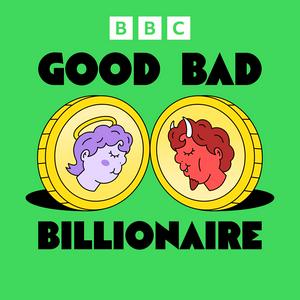How did the richest people on the planet make their billions? Find out with the Good Bad Billionaire podcast - now with a chance for you to have your say. Make up your minds whether you think they are good, bad or just another billionaire.Latest episodes: Luciano Benetton and Elon Musk.In each episode of Good Bad Billionaire, BBC Business Editor Simon Jack and journalist and author Zing Tsjeng analyse the lives of the super-rich, and try to understand what motivates billionaires like Kim Kardashian and Oprah Winfrey. From acting-giant turned politician Arnold Schwarzenegger, to Spanx-founder Sara Blakely, Simon and Zing rate their wealth, power, philanthropy and associated controversies, putting them to the test with a playful, totally unscientific scorecard. Then they hand the verdict over to you: are they good, bad, or simply billionaires?Get in touch by email and let us know what you think! The contact details are at the end of these show notes.Ever wondered how Taylor Swift went from country singer to money-spinner? How Amazon boss Jeff Bezos came to launch one of the biggest corporations of the internet age? And how six-time NBA champion Michael Jordan made his fortune with Nike? Trawl through the archives to find out how Selena Gomez went from a child Disney star to a mega-magnate of makeup, and how Martha Stewart, the “original lifestyle influencer”, became one of the most successful women in business.We explore the life of British inventor Sir James Dyson, and learn about some of the big names behind Snapchat, Minecraft, Marvel, ChatGPT, Google and Alibaba, which shape the world we live in today.In a special season, we have also told the stories of the pioneers who helped build the United States of America: the world’s first billionaire John D Rockefeller, motor magnate Henry Ford, the aviator and filmmaker Howard Hughes, Walmart founder Sam Walton, and Hetty Green - once dubbed “The Witch of Wall Street”.It's not just how billionaires made their money; it's what they did with it next.So, what do you think? Make up your own mind. Are they good, bad, or just another billionaire? Let us know your thoughts, and we may include your comments and suggestions in a future episode. If you do not wish for your comments, first name or location of comment to be read out, please say that in your email or message, or mark it confidential.Email
[email protected] or drop us a text or WhatsApp to +1 (917) 686-1176.To find out more about the show and read our privacy notice, visit www.bbcworldservice.com/goodbadbillionaire


